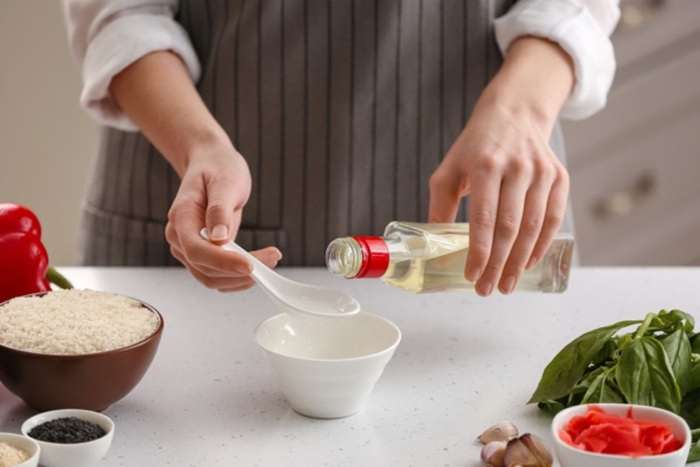Suppose that you are preparing sushi, a stir-fry, or salad dressing, and it requires rice vinegar. You go into your pantry, and you find that it is empty. What do you do? That is where the knowledge of a rice vinegar substitute would be useful.
Rice vinegar or rice wine vinegar is a type of mild, slightly sweet vinegar produced using rice which is fermented. It is a popular ingredient in Asian cuisine, whether it is Japanese sushi or Chinese stir-fries and Korean pickles. Its distinct taste profile, which is both light and not excessively sweet with reduced acidic levels, compared to other vinegars, makes it flexible and an important ingredient in most dishes.
Table of Contents
Why People Use Rice Vinegar
There are several distinct characteristics of rice vinegar that place it in the kitchens of every country:
- Mellow taste: Rice vinegar is not bitter like the white vinegar but is mild and slightly sweet.
- Acidity: It does not dominate other ingredients.
- Versatility Perfect in sushi rice and salad dresses, marinades, dipping sauces and stir-fries.
- Adds flavor: It balances salty, sweet and umami flavors in the meals
Due to these attributes, a proper replacement will have to be sought out. You do not want any vinegar but something that resembles the sweet, sour and mellow-sweet taste of rice vinegar.
Substitutes that are best to use in place of rice vinegar.

There are a number of vinegars and acidic liquids that may be used as a replacement for rice vinegar. They all have their individual flavor and acidity and therefore you must match the substitute with your recipe.
White Wine Vinegar
One of the most similar substitutes is white wine vinegar. It is acidic and tastes like rice vinegar though a little less sweet. It is great in salad dressing, marinade and stir-fries. Substitute rice vinegar, in proportions, with white wine vinegar. One can add a small pinch of sugar in case the recipe needs a taste of sweetness.
Apple Cider Vinegar
Apple cider vinegar is also a tangible item in every pantry, and it is easy to substitute rice vinegar with it. It is fruity and has a mild acidity and is utilized in most of the dishes that require the use of rice vinegar. Apple cider vinegar is a little bit stronger so you might wish to add a little less or mix with a little bit of water. It particularly works well in pickling, sauces and salad dressings.
Lemon or Lime Juice
Fresh lemon or lime juice gives it an acidic taste and a refreshing fresh taste. Although it does not replace the small gentle sweetness of rice vinegar, it can be used in dressings, marinades and fast pickles. Add the same quantity of juice, as of rice vinegar, but sweeten accordingly by the addition of a pinch of sugar or honey.
Distilled Vinegar with Sugar White.
In case no other is on hand, you can imitate rice vinegar by mixing a small portion of white distilled vinegar with a small portion of sugar. To one tablespoon rice vinegar, combine one tablespoon of white vinegar with 1/2 teaspoon of sugar. This imitates the acidity and sweetness of rice vinegar that is mild.
Champagne Vinegar
Champagne vinegar is a light vinegar of a delicate taste. It may be used as a substitute to rice vinegar in most of the recipes especially in sauces and salad dressings without overwhelming the other ingredients. Equal quantities of it should be used with rice vinegar.
Sherry Vinegar
Sherry vinegar is more dense and rich in taste than rice vinegar and may be utilized as an emergency. It works perfectly in marinades, dipping sauces and cooked meals, although its more pronounced flavor can slightly change the flavor profile. Instead of using the quantity of sherry vinegar as the recipe uses in rice vinegar, use a little bit less to prevent the food being overwhelmed with the vinegar.
Guidelines to Selecting an appropriate Substitute.
The selection of the rice vinegar alternative would be based on the dish and the flavor intended. Here are some tips:
- In the case of sushi rice, it is best to use mild and slightly sweet alternatives such as the white wine vinegar or apple cider vinegar.
- In the case of dressing, lemon or lime juice can give freshness.
- In the case of marinades, sherry vinegar will be used to give it a complex flavor and white vinegar with sugar will replicate the initial flavor.
- When in doubt, taste as you go. Alternatives to vinegar may be of different strengths, and therefore increase quantity bit by bit.
- A pinch of sugar or honey can be added to give your dish a hint of a rice vinegar taste.
Practical Kitchen Uses


Sushi Rice
The sushi rice is also prepared using rice vinegar to give it that distinct mild and tangy taste. White wine vinegar mixed with a pinch of sugar can also accomplish the same effect in case you are out, but will not make the rice too bitter.
Stir-Fries
In the case of stir-fry sauces, rice vinegar can be used in its place by a splash of apple cider vinegar or lemon juice. It promotes a balance of the salt and soy sauce with sweetness in the sauce and imparts brightness.
Salad Dressings
Vinaigrettes are best with rice vinegar. Replacing it, one should use a light vinegar such as champagne or white wine vinegar. Add sugar to make the dressing balanced.
Pickling
Rice vinegar is frequently required as quick pickles or pickled vegetables. The flavor and acidity can be replicated with apple cider vinegar or white one with sugar, and the crunch and the taste of the vegetables could be maintained.
Marinades
Mild acidity of rice vinegar is advantageous in marinades of meat, tofu or vegetables. Lemon or lime juice can be used to add a fresh tang, and sherry vinegar can be used to give cooked food more depth.
Common Mistakes to Avoid
- Substituting sugar with strong vinegar alternatives such as balsamic vinegar. It is able to overwhelm fragrant cuisine.
- Forgiving to add sweetness in case of using lemon, lime or apple cider vinegar. Rice vinegar is a little bit sweet.
- Excess use of sherry vinegar; the richer flavor of it can take the dish.
- Adding distilled white vinegar instead of sugar; the acuity can destroy the taste spectrum.
- Failure to taste and adjust incrementally; vinegar substitutes do not fit the same, and therefore little changes will guarantee balance.
FAQs
Q: Can I substitute apple cider vinegar for rice vinegar?
A: Yes, apple cider vinegar is a sweetish and mild replacement. Use just a tad less or add water if they are very thick.
Q: Is lemon juice interchangeable with rice vinegar?
A: Yes, in dressings or marinades, or to make stir-fry. Sweetness should be adjusted to balance the acidity.
Q: Can I use white wine vinegar instead?
A: Absolutely. It’s about as close as it gets, in terms of taste and acidity. If you wish, add a little sugar to taste.
Rice vinegar: A staple of Asian and fusion cuisine, rice vinegar has a mild, sweet tang. But you can work around that, if you run out of it. There are many great alternatives to rice vinegar, such as white wine or apple cider vinegar and even lemon juice and sherry.
All subs have their own personality and can shift the finished dish flavorwise a bit, but if they are properly finished the taste profile and balance of your dish will not be compromised. Don’t forget a pinch of sugar or honey — that, too, is part of the mirroring here, mimicking the faint sweet note in rice vinegar.
Cooking is not about following a recipe it’s about being able to master basic techniques and becoming comfortable with your own choices in the kitchen. Not just because it was an instance of kitchen creativity: Observing the flavors, measuring carefully, tasting as you went.

